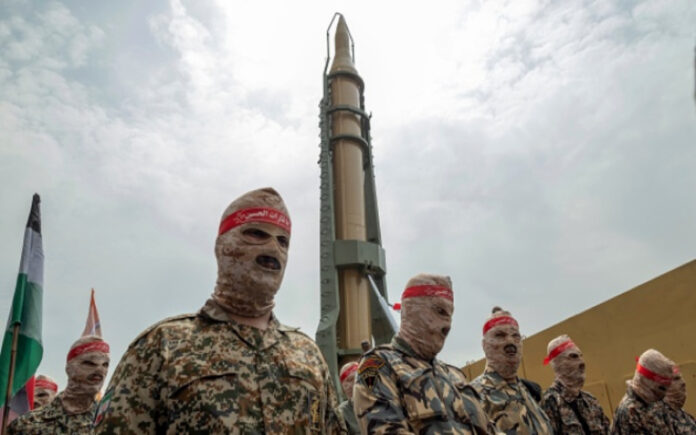Moscow/Tehran: Iran is reportedly preparing to deliver hundreds of Fath-360 close-range ballistic missiles to Russia, with dozens of Russian military personnel currently being trained in Iran to operate the system. Two European intelligence sources informed Reuters that the satellite-guided weapons are expected to be sent to Russia imminently for use in its ongoing war in Ukraine.
According to the intelligence sources, Russian defense ministry representatives signed a contract on December 13 in Tehran with Iranian officials. This contract covers not only the Fath-360 but also another ballistic missile system developed by Iran’s state-owned Aerospace Industries Organization (AIO), known as the Ababil. The sources requested anonymity due to the sensitive nature of the information.
The officials disclosed that Russian personnel have been visiting Iran to receive training on the Fath-360 defense system, which can launch missiles with a maximum range of 120 km (75 miles) and carries a 150 kg warhead. One source indicated that the next logical step after the training would be the actual delivery of the missiles to Russia.
While Moscow already possesses its own ballistic missile arsenal, the acquisition of Fath-360s could enable Russia to allocate more of its existing missiles for long-range targets, while utilizing the Iranian missiles for closer-range operations, according to a military expert.
A spokesperson for the U.S. National Security Council warned that the United States, along with its NATO allies and G7 partners, is “prepared to deliver a swift and severe response if Iran were to move forward with such transfers.” The spokesperson emphasized that such an action “would represent a dramatic escalation in Iran’s support for Russia’s war of aggression against Ukraine.”
Russia’s defense ministry has not responded to requests for comment on the matter. Meanwhile, Iran’s permanent mission to the United Nations in New York issued a statement affirming that the Islamic Republic has established a long-term strategic partnership with Russia, including military cooperation. However, the statement added, “from an ethical standpoint, Iran refrains from transferring any weapons, including missiles, that could potentially be used in the conflict with Ukraine until it is over.”
The White House declined to confirm reports that Iran is training Russian military personnel on the Fath-360 system or preparing to ship these weapons to Russia for use against Ukraine.
The intelligence sources did not specify a timeline for the expected delivery of the Fath-360 missiles to Russia, but they indicated that it would be soon. They also did not provide any updates regarding the Ababil contract.
A third intelligence source from another European agency confirmed that Russian soldiers have been sent to Iran for training on Iranian ballistic missile systems, although further details were not provided. The source noted that such training is standard procedure for Iranian weapons supplied to Russia.
A senior Iranian official, speaking on condition of anonymity, acknowledged that Iran has sold missiles and drones to Russia but denied that the Fath-360 missiles had been provided. The official added that there is no legal restriction on Tehran selling such weapons to Russia. “Iran and Russia engage in the mutual purchase of parts and military equipment. How each country uses this equipment is entirely their decision,” the official stated, while also insisting that Iran does not sell weapons to Russia for use in the Ukraine war.
As part of their military cooperation, Iranian and Russian officials frequently travel between the two countries, the official added.
Also Read | Hundreds Rally in Dhaka Against Violence Targeting Hindus in Bangladesh
Destabilizing Actions
Until now, Iran’s military support for Moscow has primarily consisted of unmanned Shahed attack drones, which are less powerful than ballistic missiles and easier to intercept due to their slower speed. Iran’s semi-official Tasnim news agency reported in July 2023 that the Fath-360 system had been successfully tested by the Islamic Revolution Guards Corps (IRGC) Ground Force.
Justin Bronk, Senior Research Fellow for Air Power at the Royal United Services Institute (RUSI), a London-based defense think-tank, noted that the delivery of large numbers of short-range ballistic missiles from Iran to Russia would significantly strain Ukraine’s already overstretched missile defense systems. “As ballistic threats, they could only be intercepted reliably by the upper tier of Ukrainian systems,” he said, referring to advanced air defenses like the U.S.-made Patriot and European SAMP/T systems.
Ukraine’s Ministry of Defense has not yet commented on the matter.
The NSC spokesperson also criticized Iran’s newly elected President Masoud Pezeshkian, who had previously claimed he wanted to moderate Iran’s policies and engage with the global community. “Destabilizing actions like this fly in the face of that rhetoric,” the spokesperson remarked.
While U.N. Security Council restrictions on Iran’s export of certain missiles, drones, and other technologies expired in October 2023, the United States and European Union have maintained sanctions on Iran’s ballistic missile program due to concerns over weapons exports to its proxies in the Middle East and to Russia.
In February, Reuters reported on the deepening military cooperation between Iran and Russia, noting Moscow’s interest in acquiring Iranian surface-to-surface missiles. Although sources at the time mentioned the delivery of around 400 Fateh-110 longer-range surface-to-surface ballistic missiles, the European intelligence sources clarified that, to their knowledge, no such transfer has yet occurred.
Ukrainian authorities have not publicly reported discovering any remnants or debris of Iranian missiles during the conflict. Authorities in Kyiv have not yet responded to requests for comment.



